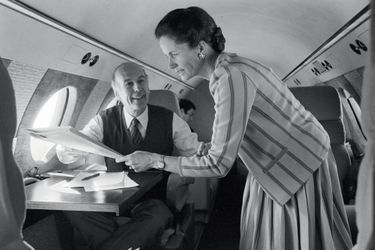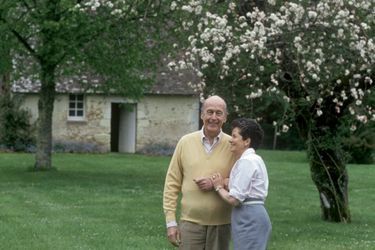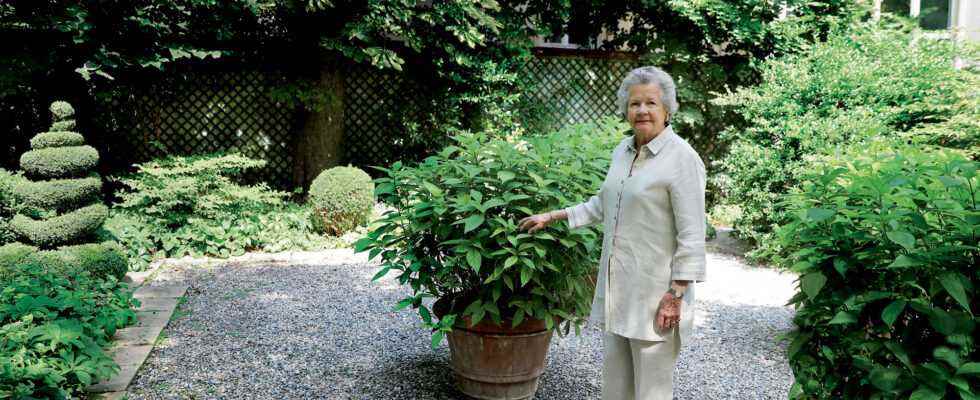All her life, she sought to preserve her secret garden. However, during a major interview granted to Cyril Viguier, broadcast on July 9 at 10 p.m. on TV5 Monde in “Territoires de France”, the discreet story of the Republic is told bluntly for Paris Match. His life close to power, his foundation for abused children, his view of presidential couples, women’s rights or ecology.
Paris Match. The French have always known you to be extremely discreet. Yet you have been a very dynamic woman. And you still are today. You live between rue Benouville, in Paris, where you receive us, and Authon, the family estate…
Anne-Aymone Giscard d’Estaing . Yes, I live at least three days a week in Authon. My roots are very strong there because it is the property of my childhood. My husband and our daughter Jacinte are buried there. What makes a large part of the charm of this place are the trees, the oaks, the chestnut trees, but also more exotic species such as the cedars that we have planted. I am still an agricultural and forestry operator and that requires a lot of administrative work.
Read also: Anne-Aymone Giscard d’Estaing, French First Lady
In his library, an open-book exchange with Cyril Viguier.
© Dominique Jacovides
So you know the difficulties of farmers?
A little. I understand their problems. Today they are confronted with all sorts of vagaries, in particular climatic, bad weather, droughts: one is never certain that all the work done will lead to something. And then we are absolutely not in control of the prices at which we will sell our productions. It so happens that in recent months, for the first time in a very long time, the prices of agricultural products have risen enormously. This has implications for the cost of living. For farmers, it is a particularly difficult new year ahead.
The secret of your extraordinary physical form is to be always active?
I think a lot of that is thanks to gardening. I maintain, I weed… It’s not a very hard physical exercise but it mobilizes the whole body and clears the head. When you prune your roses, you don’t think of anything else.
You are very fond of flowers. You have contributed to the embellishment of the Élysée, especially the exteriors.
Yes, we planted many beds and installed orange trees, which are still there. I spent most of my childhood in the countryside. I learned, from an early age, to recognize trees, the names of plants… I have always loved nature.
The Élysée Palace may have a large park and magnificent trees, but in 1974 you and your husband decided to stay on rue Benouville…
All the presidents of the Third and Fourth Republics were elderly, with no young children. This was also the case with General de Gaulle and Georges Pompidou. There was no apartment designed for a large family. We had four teenagers who had no desire to live in an official place, to walk past the Republican Guards every time they came and went. Moreover, they could not have invited their friends.
Security wasn’t an issue?
No way. I personally never had a bodyguard. I was going to do my shopping, take a walk… The inhabitants of the neighborhood used to see me since I had always lived there. I took my personal car to go to the countryside…

On April 4, 1981, on returning from a meeting in Strasbourg, during the presidential campaign.
© Jean-Claude DEUTSCH / Paris Match
You did not live at the Élysée, but you had activities there?
When I got there, I said I wanted to have an office. This caused panic because it was not planned: no first lady had ever had one. Part of the premises had to be remodeled.
“
We were a united family
“
You were discreet but determined…
Yes, this decision was mine, not the president’s. And if I remained unobtrusive next to my husband, it was because his personality made it difficult to fight for the light!
This did not prevent you from carrying out many personal initiatives. The French do not know that you were a first lady of the territories…
Yes, I thought I should be an intermediary between the president and the French. So I decided to make, almost every month, a trip to a different department. I spent two or three days immersed in local life. I visited monuments and museums, met artists, but I was also interested in economic life: I visited many factories, I even went down into a mine… And then I was particularly sensitive to social action: I went a lot to retirement homes or children’s homes.
In 1977, you also created the Children’s Foundation, which you directed for thirty-five years.
There was little in the way of social protection for child victims of violence. We have created places equipped to receive their testimonies, the toll-free number 119-Allô enfance en danger, medico-judicial units in hospitals, information campaigns… But also working groups with doctors, judges, lawyers, police officers, to try to understand the reasons for the act of attackers in order to act upstream. It was very new at the time.
In recent years, especially with #MeToo, there has been a lot of talk about violence against women. What do you think ?
Awareness took a long time, because all these facts about women have been known for a very long time. Probably more should be done.
Society has changed a lot. From now on, men are very involved in domestic issues. Was your husband?
Not a lot! The men of his generation hardly did any household chores. When I observe the way my grandson takes care of his 16 month old boy… it’s very different! When our children were small, my husband saw them for a few moments a day. But the idea that he could have given them a bottle, then there…! I think it’s good that men now take care of children.

Valéry and AnneAymone Giscard d’Estaing at the Château de l’Etoile, in Authon (Loir-et-Cher),
© Jean-Claude SAUER/PARIS MATCH
And that a woman can become president…?
I want it, and my husband also wanted it very much.
Of all the first ladies who have come after you, which one did you agree with the most?
Probably Bernadette Chirac. I had known her when Jacques Chirac was Prime Minister. But with the antagonism between her husband and mine, we couldn’t really maintain a bond. I never had any contact with Danielle Mitterrand. We didn’t have much in common.
“
President Mitterrand wanted to change everything. President Chirac, he wanted no comparison to be made.
“
And with Brigitte Macron?
At the time of the election of her husband, she called me to ask me if I could give her some advice. It’s very difficult, everyone has their own personality and experiences things in their own way. I don’t remember what I said to him, but it must have been quite general. In any case, it seems to me that it performs its function well. I have the impression that the pandemic has considerably reduced its activities.
For many French people, the 1970s are synonymous with happy years. At the start of his seven-year term, much was said of President Giscard d’Estaing that he had a taste for happiness.
We were a united family. I think his youth has given new dynamism to the French. There was a sense of renewal. I still often meet people who say to me: “In 1974, I did the campaign, we were so enthusiastic!”
In his Memoirs, your husband recounts having been booed, on his departure from the Elysée, by supporters of the new president. Was this experience painful for you too?
Very painful. Because we felt almost exiled in our own country. We wanted to completely conceal what my husband had done. There have been absolutely shocking measures. For example, when we were invited to foreign countries or by heads of state, the French embassies had instructions not to receive us.
Even today, do you think that your husband’s seven-year term has not been highlighted enough in the light of history?
President Mitterrand wanted to change everything. President Chirac, he wanted no comparison to be made. My husband’s successors did nothing if only to let history judge his seven-year term. This morning, I read an editorial in which Presidents Pompidou, Mitterrand, Chirac and Sarkozy were quoted. But not my husband. At the time, he was very affected by it. It was undoubtedly to make the period of his seven-year term better known that, in 2011, he created the Valéry Giscard d’Estaing Foundation, now chaired by our son Louis.
Of all the actions of his presidency, which is the most important to you?
What he has done in the field of art and culture is immense. He notably created the Musée d’Orsay and the Institute of the Arab World. But what is close to my heart is all that he has undertaken to improve the status of women.
Last December, on the first anniversary of the death of Valéry Giscard d’Estaing, President Macron honored him by saying in particular that he “made the European Union stronger and more united”…
Yes, it was a speech in the European Parliament very centered on my husband’s commitment to Europe, an involvement that has never wavered.
Do you consider Emmanuel Macron an heir to Valéry Giscard d’Estaing?
The word heir is not exactly appropriate. But many of President Macron’s ideas join those of my husband, and that, without a shadow of a doubt.
Find Anne-Aymone Giscard d’Estaing in “Territories of France”, July 9 at 10 p.m. on TV5 Monde.
